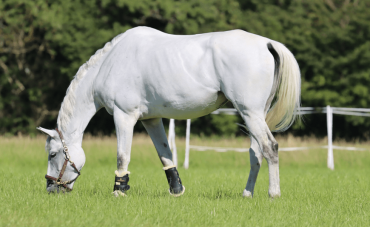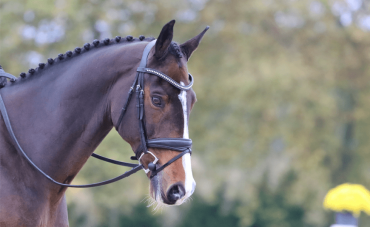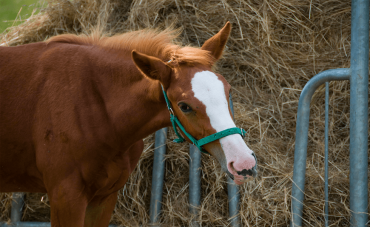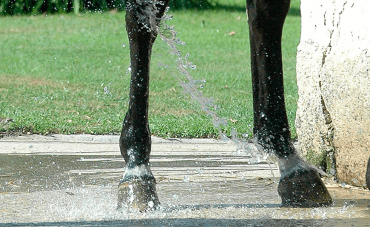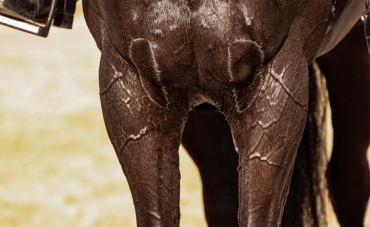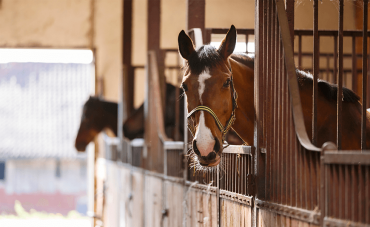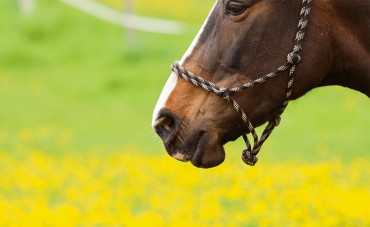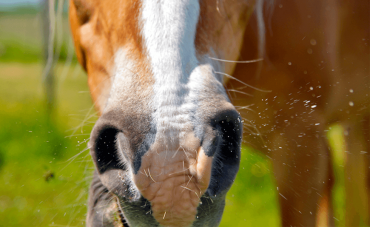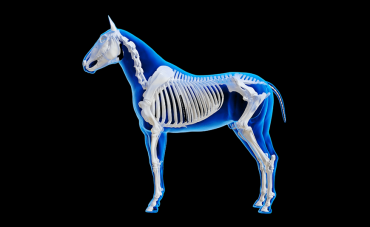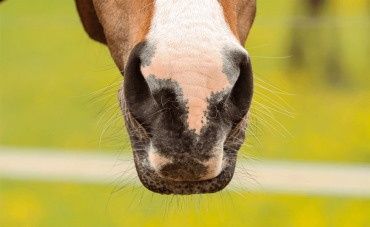One of the reasons your horse is such an incredible athlete is because of its extremely efficient respiratory system. Whether your horse is your riding companion or your faithful competition partner, its performance would not be possible without good respiratory function. So when your horse starts coughing, either during a session or while resting in the pasture, it should alert you.
As a rider, it's not always easy to know what the problem is, but the fact is that your horse is coughing. Even if the cough doesn't seem too serious and your horse only coughs once or twice at the beginning of the session, it is important to react quickly to avoid a worsening of the respiratory problems. Here are some tips on how to react if your horse is coughing.
What is a cough?
Coughing is a defence reflex of the body which aims to expel foreign bodies entering the respiratory tract (dust, pellets, dust...). It is normal as long as it is not chronic, in which case it can quickly become uncomfortable for the horse.
The cough is a consequence of the reflex contraction of the muscles of the respiratory tract, intercostals and diaphragm. Generally, this contraction is linked to a stimulation of nerve receptors that extend from the larynx to the pulmonary alveoli.
If your horse has only one coughing fit that ends with the excretion of mucus, this is not necessarily a warning sign. Any other cough that lasts longer or repeats for several days, whether your horse is resting or working, should alert you.
To characterise a cough, it is often important to consider three main parameters:
-
When did the coughing start?
Is it related to the environment, the work and the horse's diet -
Does the horse have other symptoms?
Fever, discharge, reduced performance, nosebleeds... -
What is the type of cough?
Wet cough or dry cough?
Acute cough or chronic cough?
Causes of coughing
When your horse coughs, you tend to think that your horse has 'just' caught a cold or that it has a little dust in its nose. While this may be one reason, there are many other causes. We'll take a look at the main causes of coughing:
Coughing due to infection
When we talk about infection, it is often related to a foreign body entering your horse's body. In the case of coughing, it is usually an infection related to a virus or bacteria.
If the infection is more localised or descends into the lungs (e.g. pneumonia or pleurisy), it can be more serious and cause permanent damage. In the case of bronchopneumonia, the bacteria have infested the bronchial tree. In addition to coughing, symptoms such as discharge or breathing difficulties may occur. Bronchopneumonia is a complication that can occur as a result of an oesophageal blockage. Because of the blockage food will pass into the airways instead of the oesophagus.
The most difficult thing is to detect the infection, as it is not always accompanied by a rise in the horse's temperature, which makes its diagnosis quite tricky. This is also one of the reasons why a vet should be called if your horse develops a cough.
Some viral diseases may have a coughing symptom, such as equine influenza or the respiratory form of rhinopneumonia.
Cough linked to an allergic reaction
In this case, the cough is rather related to the environment of the horse, whether it is where it lives (box, meadow, paddock, etc.) or where it works (stable, field etc.),
The horse's body will react to a foreign body and this can be compared to an allergy. The main allergens for the horse will be dust, pollen, mould, etc.
As mentioned above, determining the type of cough will be important to adapt the treatment.
Sometimes a dusty, mouldy or otherwise risky environment will cause a small inflammation which will most often involve the larynx. This cough is not usually very serious,and it is manifested by a small cough at the beginning of the exercising session. However, if it persists, the cough becomes much more difficult to treat and it can create long-lasting damage.
When the inflammation affects the bronchial tubes (and the lungs) and becomes chronic, we it is called emphysema (or equine asthma). The inflammation will lead to a reduction in the diameter of the bronchial tubes, limiting the passage of air to the lungs and preventing the horse from breathing properly. Once diagnosed, it cannot be cured and the disease will worsen with age.
There is another form of asthma related to inflammation of the airways which has similar symptoms to emphysema but less pronounced. For example, there can be little or no signs of respiratory weakness at rest. The causes of this condition are the same, however it has to do with the horse's age. Young horses are more prone to this condition (whereas emphysema usually affects slightly older horses).
Other causes of coughing
Other conditions or pathogens can cause coughing in horses, although these are more rare. These include sinusitis, parasitic conditions, fungal infections in the guttural pouches, tumours, etc.
Diagnosing the cause of the cough
If your horse has a cough, even if it doesn't seem serious, it is advisable to contact your vet as soon as possible. As we have seen, some coughs can "hide" more serious pathologies and rapid examination by a veterinarian allows a diagnosis to be made and appropriate treatment to be implemented as quickly as possible.
To determine the cause of your horse's cough, your vet can carry out various checks:
-
The examination will probably start with a stethoscope investigation in the lungs and trachea region. The vet will be able to count the breaths of your horse but also detect any abnormal noises. Certain noises such as rales or whistles can help identify the illness.
-
The bag test (forced breathing test). As the name suggests, the horse is required to breathe in a sealed bag for two minutes. This test has two objectives, it allows to amplify abnormal noises because it accentuates the breathing and it allows to see if the horse recovers quickly (simulating physical effort)
-
Endoscopy is a fairly classic examination for the diagnosis of respiratory pathologies. The aim is to introduce a tube with a tiny camera through a nostril. The veterinarian can then see if there is any inflammation, abnormalities or abnormal production (mucus) in the respiratory tract
-
Bronchoalveolar lavage (BAL) is often associated with endoscopy. The examination focuses on the lower airways (bronchi and alveoli). The principle is to send sterile water to the bronchial tubes, which is then collected. The samples are then sent to a laboratory where they are tested for inflammatory cells, bacteria or even blood.
-
Nasopharyngeal swab (PCR test): this test is used to diagnose viral diseases. A large cotton swab is inserted into the horse's nostrils to take a sample.
Treatment and prevention
Once your vet has been in, he/she will probably have identified the cause of the cough and any associated pathology. Depending on this, he/she will adapt the treatment but also the preventive measures.
There are different treatments depending on the pathology:
-
Antibiotics: these are used in the case of bacterial infections. As with any antibiotic treatment, to guarantee its effectiveness, avoid relapses and not encourage resistance, the treatment must be followed precisely (duration, dosage, etc.)
-
Bronchodilators: this is the standard treatment for horses suffering from emphysema. Their role is to limit the reduction in the diameter of the bronchial tubes due to the inflammation.
-
Anti-inflammatories: their purpose is to combat inflammation generally caused by allergens or bacteria. They are usually corticosteroids. These anti-inflammatories can be used by injection and/or by inhalation using a nebuliser.
-
Mucoactive agents: these are used when coughs are accompanied by a high production of mucus. They help clear the airways quickly and make the horse more comfortable.
In almost all respiratory diseases, medication should be accompanied by treatment of the environment, as this may be the main cause of the disease (dust, pollen, mould, etc.).
Here are the main elements that you will need to monitor whether your horse has a respiratory pathology or simply as a preventive measure. Remember, your horse's breathing is directly related to its comfort in daily life and work. When the respiratory system is affected, the consequences can be irreversible
Dust is one of the main causes of chronic diseases such as emphysema. It is also a source of discomfort even for non-asthmatic horses. This is why it is important to avoid its presence as much as possible:
- Feed hay with as little dust as possible. If you have a hay purifier at your disposal, this is ideal, otherwise you can soak the hay for several dozen minutes to rid it of dust.
- If your horse lives in a stall, try to avoid straw bedding and prefer artificial bedding such as copal or flax (in this case, provide the horse with a sufficient amount of hay to avoid further problems);
- If your horse lives in a pasture close to cultivated fields, beware of harvesting and field work periods which are very dusty. It may be a good idea to move the horse to a different pasture at this time or even to bring it in during the day.
- Choose the ground on which you work your horse carefully. Ideally, a well-watered quarry or grassy or low-dust paths should be used.
Whether you have a horse with sensitive airways, affected by a pathology or not, you can prevent and/or relieve symptoms with the help of food supplements. They can be used to make your horse feel more comfortable on a daily basis, especially during periods of risk. Certain plants such as garlic, thyme, eucalyptus or even nigella are known for their supportive effect on the respiratory tract.
Your horse's cough is a frequent problem encountered by many riders. In conjunction with your veterinarian, the rapid treatment of a cough, whether it be medicinal and/or environmental, will help reduce the severity of the problem and avoid more chronic pathologies. Managing your horse on a daily basis remains one of the best ways to prevent respiratory problems.
If your horse is coughing or you have any doubts about its breathing, do not hesitate to contact your vet.
If you have any questions about this article, please feel free to ask us on our social networks.

